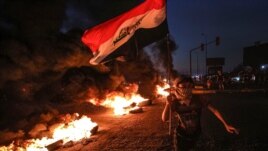06 August 2020
In Iraq's oil-rich south, the very hot summer months are forcing people to make a difficult choice. They can stay home and suffer the extreme heat, or go outside and increase their risk of coronavirus infection.
That situation describes the daily life of Zain al-Abidin since COVID-19 restrictions brought an end to his job. Now, home every day, he listens to his baby daughter cry because she is so hot. Public electricity service fails for hours at a time. And, Abidin does not have enough money to buy private electric power that could cool his home.

A protester runs holding an Iraqi flag as tires burn during a demonstration demanding better public services and jobs in Basra, southeast of Baghdad, Iraq, July 27, 2020.
Temperatures have hit record highs this summer. It was 52 degrees Celsius in Baghdad last week. Iraq's power supply has again failed to meet demand, leading to a renewal of anti-government demonstrations.
Iraqi people are under a countrywide lockdown to try to stop the spread of COVID-19. Severe budget measures are also in effect. The country is experiencing an economic crisis blamed on the new coronavirus and falling oil prices.
Politics interfere with Iraqi efforts to import additional energy. On one side, Iran is demanding payment for oil it already provided Iraq. On the other side, the U.S. is pushing Iraq to seek energy deals from other Gulf nations, say three senior Iraqi government officials. The officials spoke on condition that they not be identified.
In Baghdad, the sound of generators fill the air in the seconds following daily electricity outages. Public water stations in the city's streets provide people a way to cool themselves temporarily.
"We bring our children...and spray them with a hose to cool them down," said townsperson Ahmed Mohamed.
Protests have delayed reforms to the nation's electricity system. Private generator companies also seek to block the reforms that could harm their business interests. And Iraq appears at a loss on how to deal with a public unwilling to pay the government for electricity.
In the summer of 2018, poor electricity service led to large protests in Basra. In 2019, even larger anti-government demonstrations halted activity in Baghdad and other parts of the country's south. The protestors denounced the widespread corruption that has restricted the supply of services, including electricity.
In Baghdad last week, Iraqi security forces killed two demonstrators protesting the electric power cuts.
Aging power lines will cause a 1,000 megawatt drop in power this summer, says Iraqi Electricity Ministry officials. Supply already falls 10,000 megawatts short of demand, said a ministry official.
Emergency measures are already in effect to re-direct power from oil field operations to homes, officials in oil and electricity ministries said.
There is also the development of a gas hub in southern Iraq to feed the country's power demands. But an agreement between Saudi company ACWA Power and American Honeywell to build the hub has not been finalized.
Meanwhile, Iraqis continue taking to the streets in protest.
"The protests are the only way to show this injustice," said activist Mohammed Ibrahim.
I'm Susan Shand.
The Associated Press reported this story. Susan Shand adapted it for Learning English. George Grow was the editor.
_______________________________________________________________
Words in This Story
generator - n. a machine that creates electricity
spray - v. to spread water across a large area
hose - n. the plastic tube used to bring water to an area
hub - n. a headquarters